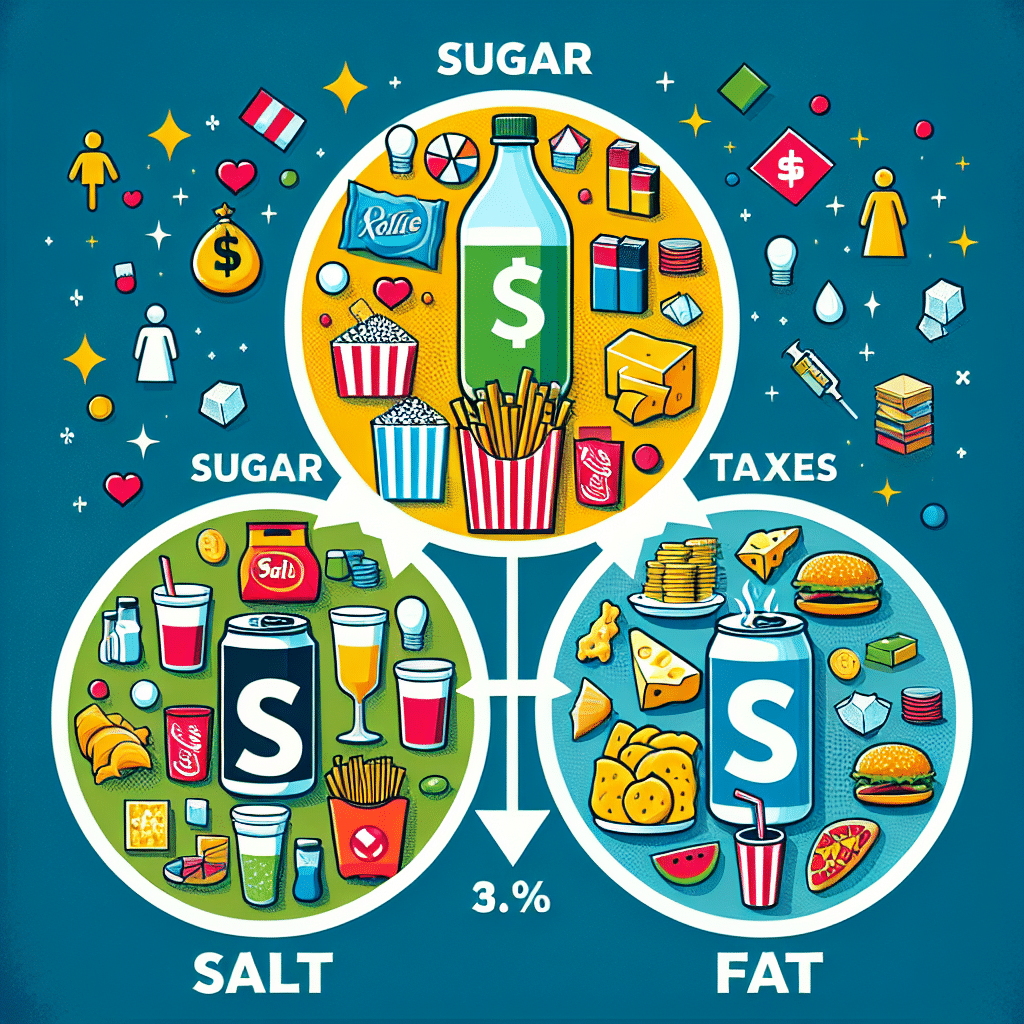What are the Effects of Sugar, Salt, and Fat Taxes?
-
Table of Contents
- Exploring the Impact of Sugar, Salt, and Fat Taxes on Public Health and Economy
- The Rationale Behind Sugar, Salt, and Fat Taxes
- Effects on Consumer Behavior
- Health Outcomes
- Economic Implications
- Case Studies and Statistics
- Challenges and Criticisms
- Conclusion: Balancing Health and Economy
- Enhance Your Diet with ETprotein’s High-Quality Protein Products
Exploring the Impact of Sugar, Salt, and Fat Taxes on Public Health and Economy

The global rise in non-communicable diseases such as obesity, diabetes, and heart disease has prompted governments to implement various strategies to combat these health issues. One such strategy is the imposition of taxes on unhealthy food components like sugar, salt, and fat. These taxes aim to reduce consumption of unhealthy foods, improve public health, and generate revenue for health programs. This article delves into the effects of these taxes, examining their impact on consumer behavior, health outcomes, and economic factors.
The Rationale Behind Sugar, Salt, and Fat Taxes
Before discussing the effects of these taxes, it is important to understand the rationale behind their implementation. Governments impose sugar, salt, and fat taxes for several reasons:
- To discourage excessive consumption of unhealthy foods and beverages.
- To reduce the prevalence of diet-related diseases.
- To encourage manufacturers to reformulate products with healthier ingredients.
- To generate revenue that can be invested in public health initiatives.
Effects on Consumer Behavior
One of the primary goals of sugar, salt, and fat taxes is to influence consumer behavior. Studies have shown that price increases on sugary drinks and unhealthy snacks can lead to a decrease in their consumption. For example, Mexico’s tax on sugary beverages, implemented in 2014, resulted in a significant reduction in sales of these drinks. Similarly, Hungary’s public health product tax, which covers a range of unhealthy food items, has been associated with changes in purchasing habits.
Health Outcomes
The ultimate aim of these taxes is to improve public health. Research indicates that there is a positive correlation between the implementation of these taxes and health outcomes. In countries where sugar taxes have been enacted, there has been a reported decrease in the consumption of sugary drinks, which are linked to obesity and diabetes. The long-term effects of these taxes on obesity rates and other health indicators are still being studied, but early evidence suggests a potential for positive impact.
Economic Implications
Beyond health, sugar, salt, and fat taxes have economic implications. They generate additional revenue for governments, which can be used to fund health programs or subsidize healthier food options. However, there is also concern about the potential negative impact on the food and beverage industry, including job losses and decreased sales. The overall economic effect of these taxes depends on various factors, including the tax rate, how the industry responds, and how consumers adapt their purchasing behavior.
Case Studies and Statistics
Several countries have implemented taxes on sugar, salt, and fat with varying degrees of success. Here are some notable examples:
- Mexico: After implementing a tax on sugary drinks, Mexico saw a 5.5% decrease in the first year and a 9.7% decrease in the second year in the purchase of taxed beverages.
- United Kingdom: The UK’s Soft Drinks Industry Levy led to a significant reduction in the sugar content of drinks and a shift in consumer purchases towards lower sugar options.
- Chile: Chile’s comprehensive approach, which includes taxes, marketing restrictions, and labeling laws, has led to a decrease in the consumption of sugary beverages and unhealthy snacks.
Challenges and Criticisms
Despite the potential benefits, sugar, salt, and fat taxes face challenges and criticisms. Some argue that these taxes are regressive, disproportionately affecting low-income populations. Others believe that education and voluntary industry reformulation are more effective strategies. Additionally, there is the challenge of ensuring that the tax revenue is indeed used for health-promoting activities.
Conclusion: Balancing Health and Economy
The effects of sugar, salt, and fat taxes are multifaceted, impacting consumer behavior, health outcomes, and the economy. While these taxes can lead to positive health changes, they must be carefully designed to address potential economic drawbacks and ensure fairness. Ongoing research and case studies from around the world will continue to inform best practices for implementing these taxes effectively.
Enhance Your Diet with ETprotein’s High-Quality Protein Products
While reducing the intake of sugar, salt, and fat is crucial for maintaining a healthy diet, it’s equally important to ensure adequate protein consumption. ETprotein offers a range of organic bulk vegan proteins that can help support a balanced diet. Their products, including organic rice protein, pea protein, and various seed proteins, are non-GMO, allergen-free, and feature high purity levels. Incorporating these high-quality proteins into your diet can contribute to better health and wellness.
About ETprotein:
ETprotein, a reputable protein and L-(+)-Ergothioneine (EGT) Chinese factory manufacturer and supplier, is renowned for producing, stocking, exporting, and delivering the highest quality organic bulk vegan proteins and L-(+)-Ergothioneine. They include Organic rice protein, clear rice protein, pea protein, clear pea protein, watermelon seed protein, pumpkin seed protein, sunflower seed protein, mung bean protein, peanut protein, and L-(+)-Ergothioneine EGT Pharmaceutical grade, L-(+)-Ergothioneine EGT food grade, L-(+)-Ergothioneine EGT cosmetic grade, L-(+)-Ergothioneine EGT reference grade and L-(+)-Ergothioneine EGT standard. Their offerings, characterized by a neutral taste, non-GMO, allergen-free attributes, with L-(+)-Ergothioneine purity over 98%, 99%, cater to a diverse range of industries. They serve nutraceutical, pharmaceutical, cosmeceutical, veterinary, as well as food and beverage finished product distributors, traders, and manufacturers across Europe, USA, Canada, Australia, Thailand, Japan, Korea, Brazil, and Chile, among others.
ETprotein specialization includes exporting and delivering tailor-made protein powder and finished nutritional supplements. Their extensive product range covers sectors like Food and Beverage, Sports Nutrition, Weight Management, Dietary Supplements, Health and Wellness Products, and Infant Formula, ensuring comprehensive solutions to meet all your protein needs.
As a trusted company by leading global food and beverage brands and Fortune 500 companies, ETprotein reinforces China’s reputation in the global arena. For more information or to sample their products, please contact them and email sales(at)ETprotein.com today.












